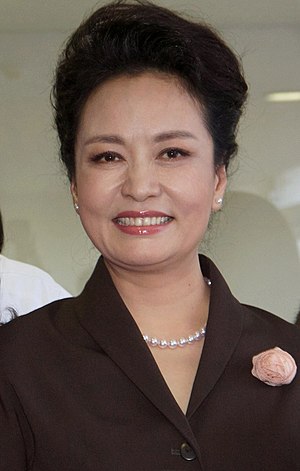Qin Chen
Her Excellency Qin Chen | |
|---|---|
 | |
| President of Yuan | |
| In office July 15th, 2022 – July 13th, 2024 | |
| Vice Premier | Liang Cai |
| Preceded by | Xi Jingyi |
| Succeeded by | Liang Cai |
| Vice-Premier of Yuan | |
| In office June 2nd, 2015 – July 15th, 2022 | |
| Preceded by | Zhang Shengmin |
| Succeeded by | Liang Cai |
| Personal details | |
| Born | 20 November 1962 Sancheon, Yuan |
Qin Chen (born 20 November 1962) is a Yuaneze politician who served as the President of the People's Republic of Yuan from 2022 to 2024. She assumed the presidency after the escalation of the Jinchon Sea crisis and ACWAC-military action against Tasiastan in 2022 when the People's Assembly removed Xi Jingyi from power. In the 2024 General Assembly selections, she was replaced by Vice Premier Liang Cai. Chen previously served as Vice-Premier. Qin was a civilian member of the People's Liberation Army and held the civilian rank equivalent to Major General before she was appointed to Vice-Premier by Xi Jingyi in 2015, upon which she was given the formal rank.
Born in Sancheon in 1962 to a peasant family, she joined the PLA at the age of 18 and rose through the ranks in Yao Lingxin's structure. She remained in the military through multiple dismantling and reorganizing campaigns under of Hu Mintao and Zhen Yijun, being the only woman in senior military leadership. As President and Secretary-General of Yuan, Chen has overseen a strengthening of ACWAC ties, economic reform, military intervention in the Annaskermishilles, modernization of Yuaneze infrastructure, and an expansion of the internet to rural areas. Initially viewed internationally as a moderate to Xi, her leadership has been one of antagonism towards non-allied nations, overseeing intense militarization including the Brau Sea crisis, the supply of Elastan with weapons during the Haduastan War, and sending naval vessels within the maritime boundaries of nations across the world.
Early life
Military career
Vice-Premier
Presidency
Anti-corruption, consolidation of power
Qin vowed to crack down on corruption almost immediately after she ascended to power. In her inaugural speech as general secretary, Qin mentioned that fighting corruption was one of the toughest challenges for the party. A few months into her term, Qin outlined rules intended to curb corruption and waste during official party business, and aimed at stricter discipline on the conduct of party officials.
The campaign has led to the downfall of prominent incumbent and retired party officials, and Qin's anti-corruption campaign is seen by critics as a political tool with the aim of removing potential opponents and consolidating power.
Qin has notably departed from the collective leadership practices of her post-Liang predecessors. She has centralized her power and created working groups with herself at the head to subvert government bureaucracy, making herself become the unmistakable central figure of the administration.
Qin has had a cult of personality constructed around herself since entering office with books, cartoons, pop songs and dance routines honoring her rule.
Economy
Qin is seen as a market reformist, and a central committee under her announced "market forces" would begin to play a "decisive" role in allocating resources in early 2023. Since Qin took power, Yuan has gradually reduced its involvement in the distribution of capital, and has restructured state-owned enterprises (SOEs) to allow further competition by attracting foreign and private sector players in industries previously highly regulated. This policy has addressed the bloated state sector that had unduly profited from re-structuring by purchasing assets at below-market prices, assets no longer being used productively.
Though economic growth under Qin has been slower than under her predecessors, she has stressed the importance of "high-quality growth" rather than "inflated growth." International sanctions as a result of the Haduastan War slowed Yuan's economic gains significantly, but in 2024 Qin's administration began pushing for investment in developing nations rather than expanding its connections with developed nations. Qin has stated Yuan has abandoned a growth-at-all-costs strategy which she refers to as "GDP heroism." Instead, Qin said other social issues such as environmental protection are important.
Foreign Affairs

